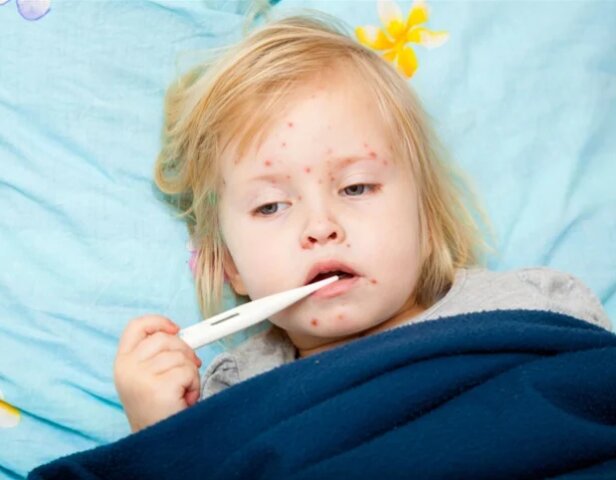You may have heard of some alarming news lately: Diseases once rare or eliminated in the U.S. reappear in different parts of the country. Measles, tuberculosis, and polio are among the infections that have been reported in recent weeks, raising concerns about public health and safety.
How did this happen? And what can we do to prevent it? We asked some experts to explain the causes and consequences of this troubling trend.
Measles is a highly contagious and preventable disease
Old Diseases Rising in the U.S.: Measles, Tuberculosis, and Polio
is a viral infection that causes fever, rash, cough, and other symptoms. It can also lead to severe complications, such as pneumonia, brain damage, and death. Measles is very contagious: One person can infect up to 18 others, according to the World Health Organization.
Thanks to widespread vaccination, measles was declared eliminated in the U.S. in 2000. But in the past few months, several outbreaks have occurred nationwide. In December, nine people in Philadelphia contracted measles after exposure at a daycare centre. In January, six people in Washington state got sick after attending a family event. And in Virginia, a traveller with measles passed through two airports, potentially exposing hundreds of others.
The CDC has issued a health alert to doctors and nurses, urging them to be vigilant for measles cases and to vaccinate their patients. As of Jan. 23, there were 23 confirmed measles cases in the U.S.
Tuberculosis affects the lungs.
The bacterial infection known as tuberculosis (TB) mostly attacks the lungs. It can cause coughs, fevers, weight loss, and night sweats. It can also spread to other organs and cause severe damage. TB is transmitted through the air when a person with active TB coughs or sneezes. TB can be cured with antibiotics, but some strains are resistant to drugs.
TB is not very common in the U.S., but it still poses a threat to some groups, such as immigrants, refugees, homeless people, and people with weak immune systems. In the past week, two schools in Pennsylvania and Las Vegas reported cases of TB among their students or staff. The health authorities are testing and treating those who may have been exposed.
The U.S. does not routinely vaccinate against TB because the risk of infection is low, and the vaccine is not very effective. However, people who travel to or live in countries where TB is prevalent may need to get tested and treated before or after their trip.
Polio can cause paralysis
Polio is a viral infection that can affect the nervous system and cause paralysis, sometimes permanently. Polio can also be fatal if it affects the muscles that control breathing. Polio is spread through contact with the feces or saliva of an infected person. There is no cure for polio, but it can be prevented with a vaccine.
Polio was once a major cause of disability and death in the U.S., especially among children. But thanks to a massive vaccination campaign, polio was eliminated in the U.S. in 1979 and most of the world by 2023. However, polio still exists in some parts of Africa and Asia, where it poses a risk of re-infection.
In 2022, a rare case of polio was detected in a child in New York’s Rockland County. The child had received a type of polio vaccine that is no longer used in the U.S. but is still used in some countries where polio is endemic. The vaccine contains a weakened form of the virus, which can sometimes mutate and cause disease. The child was isolated and treated, and no other cases were reported.
The U.S. now uses a different type of polio vaccine, which does not contain the live virus and is safer and more effective.
The importance of vaccination
The common factor behind these disease outbreaks is the lack of vaccination. Vaccines are safe and effective ways to protect yourself and others from serious and potentially deadly infections. Vaccines work by stimulating your immune system to produce antibodies that fight off the germs. When enough people are vaccinated, the germs have nowhere to go and die out. This is called herd immunity.
However, some people choose not to vaccinate themselves or their children for various reasons. Some may have religious or philosophical objections, some may have medical conditions that prevent them from getting vaccinated, and some may have doubts or fears about the safety or efficacy of vaccines. These people create gaps in herd immunity, allowing the germs to survive and spread.
The experts agree that the best way to prevent these old diseases from returning is to increase vaccination rates in the U.S. and worldwide. They also urge people to be aware of these diseases’ signs and symptoms and seek medical attention if they suspect an infection. They also advise people to practice good hygiene, such as washing hands, covering coughs, and staying home when sick.”These diseases are not gone. They are still lurking in the shadows, waiting for an opportunity to strike,” William Schaffner, medical director of the National Foundation for Infectious Diseases, says.”We have the tools to stop them. We need to use them.”
How dangerous are these outbreaks?
The risk of these diseases is still low in the U.S., according to Dr. William A. Petri, an infectious disease expert at UVA Health, who spoke to Yahoo Life. He says that measles is rare in the U.S. — usually less than 100 cases yearly. He also mentions a slight rise in tuberculosis cases in the U.S. in 2022.
However, these diseases can make people very ill. Schaffner says that many parents of young children do not realize how serious these diseases are, and they downplay them.
Infectious diseases’ expert at the University of Buffalo in New York, Dr. Thomas Russo notes that measles is one of the most infectious diseases, which means it can spread fast among unvaccinated people. He says that these diseases can be deadly.”Polio is rarer than measles, but it can have profound effects, such as paralysis.” The CDC says that tuberculosis can cause a cough that lasts more than three weeks, coughing up blood and fever, and it can kill people if they do not get the proper treatment.
Russo says these are diseases we used to control, and they are now returning.
When to get vaccinated?
Tuberculosis vaccines are not usually recommended in the U.S. But Petri says polio and measles vaccines are part of the regular vaccinations for children.
Doctors advise that you get vaccinated against these diseases if you are an adult who has not been vaccinated. Petri says you can get these vaccines from your primary care doctor or health department. They may not have the MMR vaccine (which protects against measles, mumps, and rubella) or inactivated polio vaccine (IPV) available, so you should call ahead to see if they can get them for you.
Schaffner says it is not too late to get these vaccines as adults. Russo agrees, and says: “These diseases can be even worse for adults than for children.”






